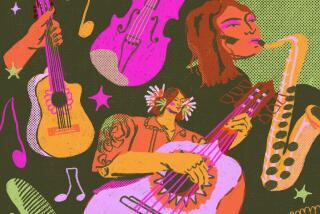Like father and mother, like son
- Share via
Mexican singer Pepe Aguilar makes a most unlikely pop idol and an even less likely sex symbol. Physically, he’s no hunk like Luis Miguel. Vocally, he’s no powerhouse like Vicente Fernandez.
So why the wild adulation for the slightly chubby star with the mild style and receding hairline who opened three nights at the Kodak Theatre on Friday? One exuberant fan even offered a pair of panties to the 34-year-old singer, who takes his family on tour with him.
The public’s obvious adoration for Aguilar stems as much from what he stands for as from what he does. For fans of Mexico’s emblematic mariachi music, which is sadly fading as a recorded art form, Aguilar stands for tradition and pride, a keeper of the musical and cultural flame.
The singer is the son of Antonio Aguilar and Flor Silvestre, an iconic couple in the history of ranchera music. In the audience Friday were fans old enough to remember Pepe, the little boy who was part of his parents’ rodeo-like spectacles.
Mexicans extend their love for children to their pop stars. So Aguilar, now all grown up, has been part of the family for decades.
Yet bloodline alone can’t inspire a following.
Aguilar also has the talent, which was evident during his tasteful, occasionally stirring two-hour performance.
Surprisingly, Aguilar sang just three numbers from his latest, Latin Grammy-nominated album, “Y Tenerte Otra Vez,” a jewel of the genre that epitomizes his modern, eclectic style. That included “A Pierna Suelta” (Loose-Legged), which has the classic populist qualities of Mexican country music: resignation and humor in the face of poverty and hardship.
The chorus is a clever play on words, in which a luckless character puts a good (bien) spin on a bad (mal) situation. (“Yo de mis males estoy rete bien, aunque de mis bienes este rete mal.”)
That sort of folk philosophy resonates with an immigrant audience that knows what it’s like to make the best of hard times -- although with ticket prices as high as $125, many fans must be beyond the need to be consoled about their budgets.
As a community, however, Mexicans rarely forget where they came from. During one of his warm and charming exchanges with the audience between numbers, Aguilar reminded fans of his roots.
He said his father tells stories about crossing illegally into the U.S. as a young man, about being repeatedly deported, about seeing signs that read “No dogs, blacks or Mexicans allowed.” The elder Aguilar even had to sleep on the streets of Hollywood near the theater where his child was now performing.
For the fans, seeing their favorite son rise to success on this stage, in a world where they once did not belong, was just one more reason to idolize him. Dressed in his beautiful black mariachi outfit with rose-red embroidery, Aguilar was their champion.
That’s why they cheered so thunderously when the singer, born in Texas but raised in Zacatecas, stated that he was “the first Latino, the first Mexican, the first Zacatecano” to perform at the Kodak.
So you would think they could provide better sound for the occasion. In an unsure start, Aguilar’s soft, subtle vocals were overpowered by the mariachi, reinforced by two keyboards, two chorus singers, an electric and acoustic guitar plus flute and saxophone.
The mix improved, and by the rousing finale his sound and steadiness were strong, even with his backup boosted by a big, brassy banda.
Aguilar left no doubt why he’s a real Mexican idol.
More to Read
The biggest entertainment stories
Get our big stories about Hollywood, film, television, music, arts, culture and more right in your inbox as soon as they publish.
You may occasionally receive promotional content from the Los Angeles Times.










